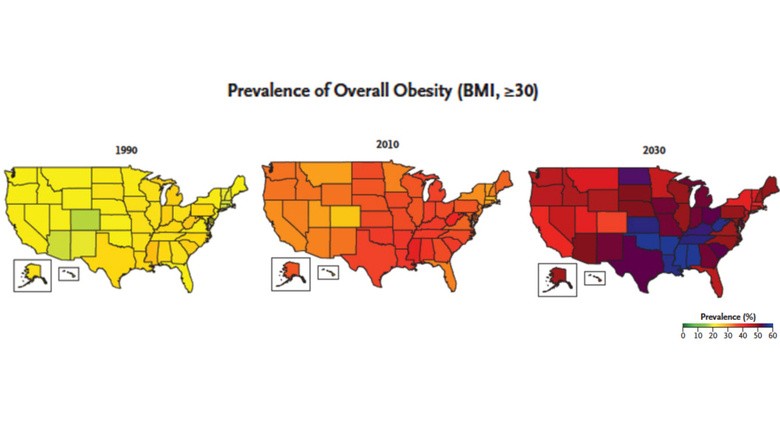
At least half of the entire population of the United States will be obese by the end of 2030, a new study predicted.
The authors of the study published on Wednesday in NEJM analyzed the self-reported body mass index (BMI) of over 6 millions American adults from the last 26 years.

They found out that 29 states, mostly from the Southern and Midwestern region, would be the most affected, with at least 50 percent residents are obese. There is also no state exempted from this heavy crisis.
And what is even more alarming is one in every four American will be severely obese -- or those who are at least 100 lbs overweight. That is a huge leap compared to the current 18 percent statistics.
Lead author Zachary Ward, an analyst at Harvard Chan School's Center for Health Decision Science, said that if this trend continues, the severe obesity will be just as "prevalent as the overall obesity in the 1990s".
Aviva Must, chair of Tufts University's Public Health and Community Medicine, said that considering how difficult it is to treat obesity, the financial consequence from healthcare expenditure will have a huge impact on society. She is not involved in the study.
An economic problem?
The study revealed an interesting information: low-income adults who make $50,000 or less per year have a high risk of obesity.
Fifty years ago, the poor people were underweight but now, it is the other way around, Must said.
She explained that the price of the food plays a role in this. Heavily-processed foods and sugar-sweetened beverages, which are low in nutrition but dense in calories, are cheaper and more affordable for the poorer people. Limited options for physical activity was also considered.
Other sub-population at risk were women and non-Hispanic black adults.
Must said that previous studies about how racism could induce stress on people and in return, influences their behavioral pattern could explain that.
Dr. Tim Lobstein, the Director of Policy at the World Obesity Federation who is also not involved in the study, previously said that obesity is a "social problem, not a private problem" since weight problem is not just an absence of willpower to eat less and work out regularly. Economic status and psychological health were also factors.
What can we do?
Must said that it is not easy, and it will require the cooperation of federal and local government to make a change and relying on individual's willpower alone will not help.
Some of her suggestions, which she claimed to be backed up by previous studies, includes improving local public transportation systems that will encourage people to walk, more access to gym and swimming pools by keeping schools open on weekends and during the summer, and improving access to low-cost fruits and vegetables.
She also said that restaurant and drive-thru menus should have calorie label.
The lead author Ward previously co-wrote a study which revealed that removing tax deduction from advertisement, improving the nutrition standards on school snacks and imposing excise tax on sugars -- collectively called "three interventions" -- will allow the federal government to save more from health care costs.
Treating obesity is hard because losing weight is hard, so the best way to combat this epidemic is through prevention, Ward said.
A previous report said that at least 250 million children will be obese by the end of 2030.
© 2025 NatureWorldNews.com All rights reserved. Do not reproduce without permission.





